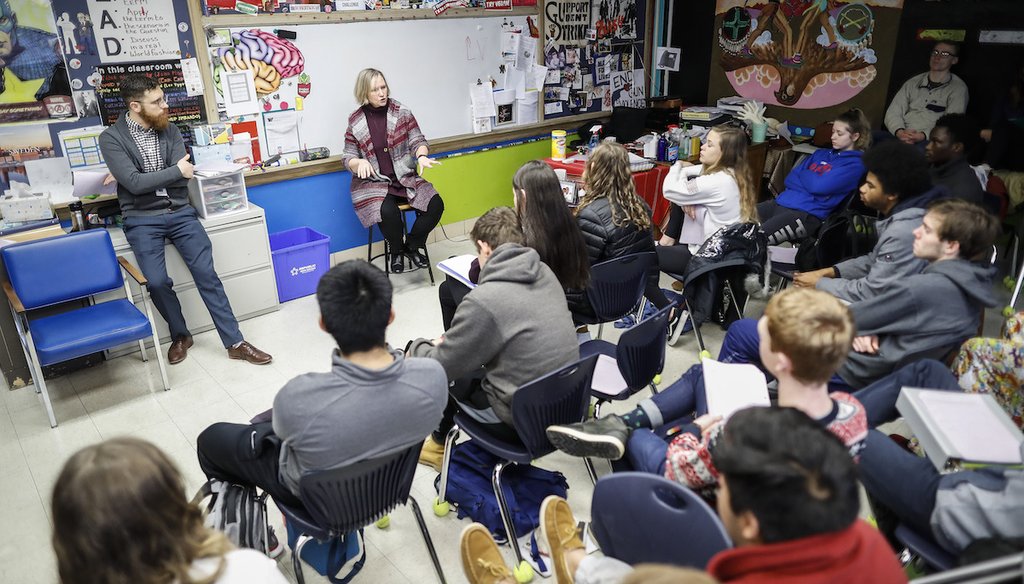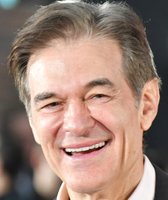Stand up for the facts!
Our only agenda is to publish the truth so you can be an informed participant in democracy.
We need your help.
I would like to contribute

In this 2019 photo, students listen as social studies teachers lead the introductory class of their American Thought and Political Radicalism course at Worthington High School in Ohio. (AP Photo/John Minchillo)
If Your Time is short
-
Critical race theory is a collection of ideas about systemic bias and privilege.
-
Conservative elected officials in about a dozen states have moved to bar critical race theory in public schools or state agencies.
Florida Gov. Ron DeSantis, a Republican, is pushing forward on a reworked civics education curriculum for K-12. For DeSantis, the new plan is as much on what it bans, as what it promotes.
"Let me be clear, there's no room in our classrooms for things like critical race theory," DeSantis said at a March press conference in Naples. "Teaching kids to hate their country and to hate each other is not worth one red cent of taxpayer money."
Critical race theory — a broad set of ideas about systemic bias and privilege — might have its roots in legal academia, but it is fast becoming one of the more explosive flashpoints in America’s state legislatures.
Conservative lawmakers in over a dozen states, including Missouri, Idaho, Tennessee, have introduced bills aimed at barring critical race theory in the classroom. The bills generally forbid teachers from offering any instruction that suggests that the United States is fundamentally racist, or that leads students to feel guilty for past actions by white people. Some of the bills expressly use the term "critical race theory" while others ban certain practices.
Educators warn that they will have their intended effect — turning teachers ultra-cautious, confining their lessons to a limited view of American history and current events.
"This will scare a lot of school districts," said Columbia, Mo., high school social studies teacher Greg Simmons. "A lot of teachers don’t feel comfortable teaching around race anyway, and this will put a kibosh on all of that."
Florida state Sen. Shevrin Jones, a South Florida Democrat and former public school teacher, said, "The crazy thing about this is, now critical race theory is not even taught in K-12 education."
Regardless, Republicans are pressing the issue.
What is critical race theory?
Critical race theory isn’t one set thing, but more a changing package of ideas.
The grandfather of the movement was Harvard Law School professor Derrick Bell, who in the mid-1970s voiced frustration at the limited impact of landmark civil rights laws and U.S. Supreme Court rulings of the previous decade. While those changes aimed to broaden access to high-quality education, jobs and housing, they fell short, he said. Laws remained embedded in a set of values and practices that discriminated against people of color, Bell said.
Legal scholars, such as Kimberlé Crenshaw, Neil Gotanda, Gary Peller and Kendall Thomas, developed Bell’s ideas further. In a 1995 book, they wrote that critical race theory is rooted in the desire "to understand how a regime of white supremacy and its subordination of people of color have been created and maintained in America."
They said that the fundamental problem was the "distribution of political and economic power." And they defined their movement as one that was "race conscious" and was committed to change.
Critics often call the theory Marxist, and there is a tie. As Crenshaw and others wrote in 1995, a "collection on neo-Marxist and new Left activists" in law schools were part of the movement to challenge the ways American law served "to legitimize an oppressive social order." Far from every scholar was a Marxist, so the label is overly broad.
In plain terms, critical race theory holds that racism is part of a broader pattern in America: It is woven into laws, and it shows up in who gets a job interview, the sort of home loans people are offered, how they are treated by police, and other facets of daily life large and small.
What are the criticisms of critical race theory?
A central complaint of critical race theory is that, because it focuses on race, the approach is itself racist. Critics say it presents solely a negative picture of the United States and is designed to make students feel badly about their country.
A group of Republican members of Congress introduced a bill and a resolution decrying critical race theory. The lead sponsor, Rep. Burgess Owens, R-Utah, said by focusing on skin color, the theory "preserves" racist thinking and "undermines civil rights."
The head of the Republican Study Committee, Rep. Jim Banks, R-Ind., said, "teaching students to be ashamed of our country and to judge each other based on their race is wrong and divisive." Rep. Rick Allen, R-Ga., added that it "aims to indoctrinate Americans into believing our nation is inherently evil."
Politicians aren’t the only ones who are concerned, however. New York University social psychology professor Jonathan Haidt raised a deep concern about the approach’s focus on power relationships
"Every situation is to be analyzed in terms of the bad people acting to preserve their power and privilege over the good people," Haidt wrote. "This is not an education. This is induction into a cult."
Educators who are open to the concepts of critical race theory counter that this is a caricature of what actually goes on inside the classroom. It "is not propaganda or anti-American," wrote professors David DeMatthews and Terri Watson in Education Week.
"It is a toolkit for examining and addressing racism and other forms of marginalization," they wrote.
Is it used in the classroom, and how do you know when it is?
Opponents of critical race theory suggest that the theory is pervasive, but that’s proven hard to pin down.
In Tennessee, press reports said that supporters of a bill to ban critical race theory didn’t cite examples from particular schools.
As Arkansas lawmakers debated a similar bill, the focus on local schools fell away, and the bill that passed only restricted state agencies. Arkansas Gov. Asa Hutchinson allowed it to become law without his signature, saying it "does not address any problem that exists."
Elements of a race-conscious approach can appear in education policies, but not as part of a full package of critical race theory.
The Illinois’ State Board of Education has guidelines for teachers that say they should "understand that systems in our society create and reinforce inequities," and "be aware of the effects of power and privilege." Those ideas fit under the broad umbrella of critical race theory, but they would fit just as well under any approach to social studies that applied a realistic lens to current problems in America.
University of Missouri education professor LaGarrett King said the problem is blown out of proportion.
"The majority of teachers are not even familiar with what critical race theory is, nor do they teach it in their classrooms," King said.
King and his colleagues have worked on study plans to help high school teachers get at tough issues, including slavery and economic inequality. None mention critical race theory itself, but some draw on the idea of systemic racism.
"It’s a lens, but it’s just one of the things taught in that class," King said. "It doesn’t define the whole curriculum."
Does it say white people should feel guilty?
One target of critical race theory opponents is the New York Times’ 1619 Project. In 2019, the newspaper published a series of articles on race and the legacy of slavery in America. 1619 refers to the year when the first enslaved Africans were brought to Virginia, then an English colony. The opening essay by Nikole Hannah-Jones includes this passage:
"The United States is a nation founded on both an ideal and a lie. Our Declaration of Independence, approved on July 4, 1776, proclaims that ‘all men are created equal’ and ‘endowed by their Creator with certain unalienable rights.’ But the white men who drafted those words did not believe them to be true for the hundreds of thousands of black people in their midst."
The 1619 project is critical of school portrayals of slavery and offers lesson plans for teaching about it in school.
Missouri Rep. Brian Seitz, a Republican, singled out this effort in his bill to bar critical race theory in schools.
"I think critical race theory, and in particular the 1619 Project, does in fact seek to make children feel guilt and even anguish, not because of anything they've done, but solely based on the color of their skin," Seitz said May 3.
Emotional responses depend on the person, but there’s no intent to make anyone feel guilty, said Columbia, Mo., high school history teacher Simmons.
Simmons draws his students at Battle High School into researching uncomfortable topics, such as issues raised by the Black Lives Matter movement. Simmons said he can’t control how someone might react, but he doesn’t frame things in terms of guilt. And he uses his own education as an example.
"We need to be real with students and show them the complexities of the world," Simmons said. "I grew up in rural Missouri in a family that used the N-word. When I got to college, I took some history and Black studies classes. Those things opened my eyes to a world that I had no clue about. My instructor didn’t try to make me feel guilty. I took it as, things are messed up. Is there some way we can make them less messed up?"
That problem solving approach changed the fate of a Utah bill. A measure to ban critical race theory in that state’s schools was moving forward until Republican Gov. Spencer Cox blocked it. Cox said he was no fan of critical race theory, but he had another concern.
"The difficulty, however, comes in defining terms and making sure that we are never stifling thought or expression — and that we make sure our children learn both the best of our past as well as our mistakes so we don’t repeat them," Cox said May 17.
What are states doing?
Lawmakers in about a dozen states have introduced bills that target teaching that might be considered part of critical race theory. The details vary.
Some bills, like the ones in Idaho and Missouri, mention critical race theory by name. Others don’t, but they all share the approach — as in Tennessee, Arizona and Iowa — of listing prohibited practices.
Those lists draw from — often word for word — the items in a September 2020 executive order from former President Donald Trump. Trump aimed to ban federal workplace training that touched on systemic racism. Trump’s list, for example, barred anything that said:
-
"The United States is fundamentally racist or sexist."
-
"An individual, by virtue of his or her race or sex, is inherently racist, sexist, or oppressive, whether consciously or unconsciously."
-
"Any individual should feel discomfort, guilt, anguish, or any other form of psychological distress on account of his or her race or sex."
-
"Meritocracy or traits such as a hard work ethic are racist or sexist, or were created by a particular race to oppress another race."
To avoid charges of squelching free thought, many of the bills, such as Louisiana’s, say that nothing in the bill should prevent teaching about "divisive topics." Some specifically protect discussion of race and discrimination.
In Florida, DeSantis said he banned critical race theory, but it wasn’t a part of the curriculum previously. Rather, the state’s new draft civics curriculum emphasizes teaching about patriotism and love of country, citizenship, the U.S. form of government and the Constitution. A proposed rule bans teachers from indoctrinating students with information beyond the state’s standards. State education commissioner Richard Corcoran said in a recent speech that the state is keeping "crazy liberal stuff" out of Florida’s schools.
That has fueled criticism of DeSantis and the draft curriculum. Ted Thornhill, director of the Center for Center for Critical Race and Ethnic Studies, wrote in an op-ed that the comments by DeSantis were "dangerous, calculated race-baiting nonsense."
Simmons, the Missouri high school teacher, says what seems lost in the debate is the good that can come from discussing hard topics like race.
"I was raised to be racist and sexist," Simmons said. "That’s a bias that I had to work through. The kids I teach see the world differently. And they are much more accepting of anyone who is different in any way. They get it."
Our Sources
Kimberlé Crenshaw et al., Critical Race Theory: The key writings that formed the movement, 1995
Current Legal Problems, Critical Race Theory: Past, Present, and Future, December 1998
American Bar Association, A Lesson on Critical Race Theory, Jan. 12, 2021
Power and Education, Who’s Afraid of Critical Race Theory in Education? A Reply to Mike Cole’s ‘The Color-Line and the Class Struggle’, January 2009
AP, DeSantis knocks critical race theory in civics curricula, March 17, 2021
Rep. Burgess Owens, Owens Introduces Legislation to Combat Critical Race Theory, May 14, 2021
Heritage Foundation, How Leftists’ Critical Race Theory Poisons Our Discussion of Racism, June 29, 2020
The Hill, Arkansas governor allows bill targeting critical race theory in state agencies to become law, May 3, 2021
Chalkbeat Tennessee, Tennessee lawmakers advance bill to ban critical race theory instruction in public schools, May 3, 2021
Federal Register, Executive Order 13950 - Combating Race and Sex Stereotyping, Sept. 22, 2020
African American Policy Forum, Truth Be Told, accessed May 19, 2021
Missouri General Assembly, House Bill 952, April 28, 2021
Iowa Legislature, House Bill 802, May 6, 2021
Tennessean, Tennessee bans public schools from teaching critical race theory amid national debate, May 6, 2021
Deseret News, Utah House, Senate call ‘extraordinary’ sessions for resolutions on critical race theory, 2nd Amendment sanctuary, May 18, 2021
Deseret News, Why Gov. Cox left critical race theory and 2nd Amendment sanctuary off special session agenda, May 17, 2021
Tennessee General Assembly, Senate Bill 623, May 4, 2021
Idaho Legislature, House Bill 377, April 28, 2021
Arizona Legislature, SB 1532,May 5, 2021
Arizona Republic, Arizona bill banning 'biased' topics in schools advances, May 6, 2021
Washington Post, SBC President J.D. Greear: ‘God did not call Southern Baptists to save America’, Feb. 24, 2021
Heritage Foundation, Keep Racist Critical Race Theory Ideology Out of K-12 Classrooms, April 22, 2021
Education Week, No, Critical Race Theory Isn’t ‘Anti-American’, Oct. 5, 2020
KSDK, Explaining critical race theory and why it's causing a stir in schools across the country, May 3, 2021
Realclear Education, A Third Way on the Place of Critical Race Theory in the Classroom, March 29, 2021
Illinois State Board of Education, Illinois State Board Of Education Implements New Teaching Standards To Better Serve Diverse Population Of Students, Dec. 16, 2020
Heterodox Academy, Critical Theory or Common Humanity? The Case for a Liberal Approach to Social Studies Education, Feb. 10, 2021
City Journal, The age of outrage, Dec. 17, 2017
Social Education, Making inquiry critical: Examining power and inequity in the classroom, January 2018
University of Kentucky, C3 Hub, accessed May 18, 2021
KSDK, Rockwood forum turns heated during discussion of race and class curriculum, April 30, 2021
Christopher Rufo, tweet, March 15, 2021
Sun Sentinel, DeSantis pushes civics training, March 18, 2021
USA Today, DeSantis knows nothing about Critical Race Theory, March 28, 2021
Florida, House Bill 5 Civics Education Curriculum, 2021
Florida Today, It's OK to talk about race issues in the classroom, April 13, 2021
Sun Sentinel, DeSantis pushes civics training, March 18, 2021
USA Today, Teaching kids to hate America? Republicans want ‘critical race theory’ out of schools, May 13, 2021
Ed Week, What Is Critical Race Theory, and Why Is It Under Attack? May 18, 2021
Journal of Sociology of Race and Ethnicity article by Ted Thornhill, We Want Black Students, Just Not You: How White Admissions Counselors Screen Black Prospective Students, Sept. 5, 2018
Florida Channel, Press Conference on Civics Education, March 17, 2021
Gov. Ron DeSantis press release, Governor Ron DeSantis Announces the Civic Literacy Excellence Initiative, March 17, 2021
Tampa Bay Times, What should Florida kids learn about U.S. history? A rule is in the works. May 19, 2021
Interview, Gregg Simmons, history teacher, Battle High School - Columbia, Mo., May 19, 2021
Interview, LaGarrett King, associate professor of social studies education, University of Missouri, May 19, 2021
Email exchange, Mike Gonzalez, senior fellow, Heritage Foundation, May 18, 2021
Email interview, Laureen Ricks, Duval County Public Schools spokesperson, May 18, 2021
Email interview, Cheryl Etters, Florida Department of Education spokesperson, May 20, 2021
Interview, Bacardi Jackson, managing attorney in the Miami office for the Southern Poverty Law Center, May 18, 2021
Telephone interview, Ted Thornhill, Director, Center for Critical Race and Ethnic Studies/Associate Professor at Florida Gulf Coast University, May 19, 2021
Telephone interview, Florida state sen. Shevrin Jones, May 19, 2021
Email interview, Christina Pushaw, spokesperson for Gov. Ron DeSantis, May 19, 2021
Email exchange, Jonathan Haidt, professor of social psychology, Stern School of Business, New York University, May 24, 2021



















































